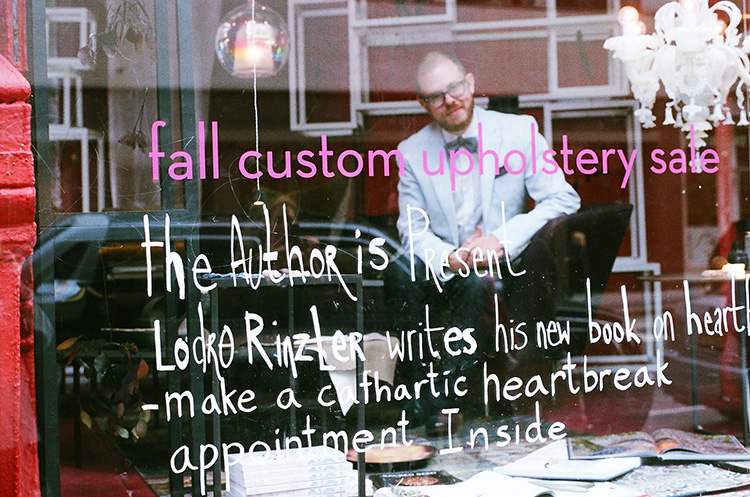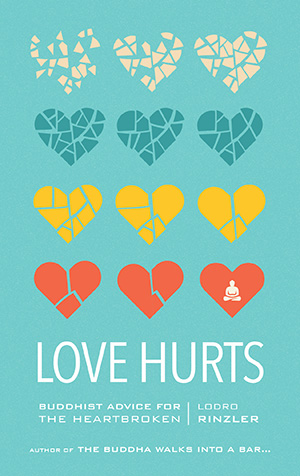
Talking heartbreak with strangers in a store window sheds light on the pain we feel and the traps we fall into
—
Why talk heartbreak with a complete stranger?
In my own experience, one thing that helps me when I am suffering is simply to be heard, to be witnessed. When we sit one-on-one in the presence of each other we experience one another in a very human and honest way. Sometimes the best way to see ourselves through our heartbreak is to be with our heartbreak — and sometimes that even includes connecting with strangers. It is out of this inspiration that the notion of my ‘Heartbreak Appointments’ was born.
I wrote a previous book on relationships, How to Love Yourself (And Sometimes Other People), with my good friend Meggan Watterson. I’ll never forget when we sat down to discuss heartbreak. She said something that has always stuck with me — “The thing about romantic relationships is that it’s not the heart that breaks, it’s the ego.” When we have a storyline in our head about a perfect relationship and that person pivots and exits the scene, it’s not our heart that’s destroyed; it’s our whole collection of storylines created from who we think we are in relation to them.
When you let go of the storylines around why this person left or who is to blame for your tragedy or why a particular national tragedy occurred, you are left with a feeling of vulnerability. You are left with a raw tenderness. You are left with a powerful experience of your own heart. A broken heart is really just our natural heart stripped of its comfortable storyline armor. It’s not a good feeling, from a conventional point of view, but it is good for us. When we are able to stay with our openness and vulnerability we find that we possess tremendous strength. This is precisely what inspired me to meet with people to bear witness to their stories of heartbreak, with the intention and hope that our work together could move some of the seemingly stuck feelings around that emotion — to rescript the old storyline and to make space for the new.
Love Hurts: Buddhist Advice For The Heartbroken
During my heartbreak appointments I learned a good many ways that one’s heart can be shattered. However, whether someone told me a scenario revolving around the death of a loved one, a messy break-up, becoming estranged from someone they cared about, or feeling let down by society overall, there was one thing each story held in common:
The heartbreak was based in feeling that things should be one way, and becoming disappointed to learn that they were another.
Yes, that is the great discovery: things aren’t the way we like them to be and as a result our heart becomes broken. Another way to look at this is that we become really attached to our ideas and fixed expectations of how things should be, and when anything other than our specific notion of how things should work occurs, our elaborate fantasy explodes.
Each heartbreak appointment had a distinct arc:
- Things were normal or sometimes even really good
- Things were supposed to keep happening and/or only get better
- There was a moment of crisis/challenge/change
- One or more people acted in ways that the other person did not expect
- Heartbreak ensued
Some people, incidentally, ended their story by saying, “And now, after time and talking about it a lot, I’m okay. I am healing from that incredible heartbreak and disappointment.” Other issues for people, like long-standing racism in our society, were not expected to just stop tomorrow, but people still held out hope that the incidents that sparked their heartbreak might slow or stop over time.
Your heart breaks because life isn’t what you thought it would be. At least, that’s been the case with me. For example, I thought my father would meet the woman I would marry and my potential kids. That didn’t happen — he died when I was thirty — and that was one of the hardest things about his death for me.
That example showed me how we let our minds spin our storylines with ‘What if’ thinking and fixed expectations at all times. “What if I found someone to marry me right now…then my dad would have met her before he dies!” Or “This person claims they want to spend their life with me…so it’s definitely going to work out.” If we’re on a good first date our mind leaps to the second date, third date, maybe even to moving in together down the road or meeting this person’s family. If we’re in a serious relationship we think about marriage or having children together. If we have a good friend and they are young we make assumptions that we will grow old together. If we have a family member and they are in good health we plot the next big holiday we can spend together.
But things change. Relationships and people change and expire, sometimes with no real cause.
We become attached to our storylines, including an attachment to being a hopeless romantic, to the way things were, to the fact that you are in love with someone who is not in love with you, to the way things could have been or still could be. Our minds constantly leap to the past or the future, and rarely do we rest with the way things are right now. Instead we perpetuate any sort of thought that involves the way they could be. Because we spend most of our mental energy in the land of What If, we are startled and shocked when reality intervenes and shows us the land of The Way Things Are.
In this way, it’s not the heart that breaks, it’s the ego. Our respective egos are the conglomeration of set notions about who we are, how we respond to various aspects of our life, what we like, what we don’t like, and what we really couldn’t care less about. You may have started off pretty fluid when you were a kid, open to a world of possibility, but over time you likely have really solidified things.
For example, you may have had an aversion to Brussels sprouts as a kid, but give that set notion a few decades of reification and you now have a life where you are set in the belief that you absolutely hate Brussels sprouts. That’s your undeniable reality. But someday you may eat a Brussels sprout and discover you love it, and that you’ve wasted decades of not enjoying this one thing because of your fixed idea about it. We do this with most of the things in our lives.
It’s not just Brussels sprouts. We have set expectations and opinions about every aspect of our world from the types of movies we like, to the types of people we date, to the form of work we should do. A passing fancy becomes an idea which becomes a way we do things which becomes a part of who we are. We solidify our life in so many ways. That’s ego.
If that sounds yucky to you then I have good news: your set ego has an arch-enemy called Reality.
Reality has a master attack plan with its whole ‘The Way Things Are’ schtick, and constantly shakes our firmed up ego. Reality says, “Brussels sprouts are really tasty” or “Actually, this person would be really kind to you, despite your set notions of who you believe you should date” or “You thought this person would grow old with you? Too bad! He’s dead.” We feel discomfort and pain, and our response is to say that our heart is breaking, because our set notion of who we are and what our world is supposed to look like has been shattered.
Our heart is not physically altered, to the best of my knowledge. Sometimes when there is a particularly traumatic break up or sudden death, that emotional pain can feel physical, which is known as broken heart syndrome. But really what we’re talking about is the fixed expectations of what we thought was going to happen have been changed.
Our fantasies, our fairy tales, our stories that we tell ourselves that all seem so, so real — those are the things that break. And that is what causes us pain.
If I were you, I’d read this and think, “Well then maybe the best way to avoid my ego shattering is to just not let anyone into my heart.” Good luck to you! That’s not how our heart works. Our heart yearns to love. The head of the Kagyu lineage of Tibetan Buddhism is right around my age and is somehow a million years wiser than most anyone I know. He once said, “The point I want to make is that love can be true and lasting, under the right conditions…Yet often, instead of giving love room to expand, we box it in with our expectations. Expectations make our love conditional on what the other person does or says…For love to last, it is best not to have too many expectations. It is better just to offer love.”[1]
We need to give our love room to grow. If we box it in with our set notions of how things should be, we’re dooming ourselves to a death by a thousand heartbreaks. If we can relax into the way things are, as opposed to how we wish things would be, then we can engage our life whole-heartedly.
One of the women who came to the heartbreak appointments, Sarah, shared with me a beautiful way that she thought of her pain. “It’s like moving,” she said. “One thing has to end, so you go through this whole process that’s strenuous and sad, and you get sweaty and emotional, and go through all of the things you just assumed you would continue to keep with you, and some you keep and some go in the trash. Then you walk out, with those things you need to keep, and say goodbye. Then, you get to move into this new space, where you can do so much with what you brought with you.”
Heartbreak isn’t just pain and suffering. There’s also an opportunity to take what you learned with you, and apply it so you grow in all sorts of ways.
You may end up learning that you are constantly changing, and your ego isn’t as tight as you think it is, and that you can actually relax some of that ‘What If’ thinking and become comfortable with ‘The Way Things Are’. Those sorts of lessons strike me as incredibly valuable.
From Love Hurts: Buddhist Advice For The Heartbroken, by Lodro Rinzler, © 2016 by Lodro Rinzler. Reprinted by arrangement with Shambhala Publications, Inc., Boulder, CO. www.shambhala.com
[1] The Karmapa, Ogyen Trinley Dorje, The Heart is Noble: Changing the World from the Inside Out (Shambhala Publications, 2013), p. 27
You may also enjoy Interview: Lodro Rinzler | A Mindful Life with Kristen Noel
